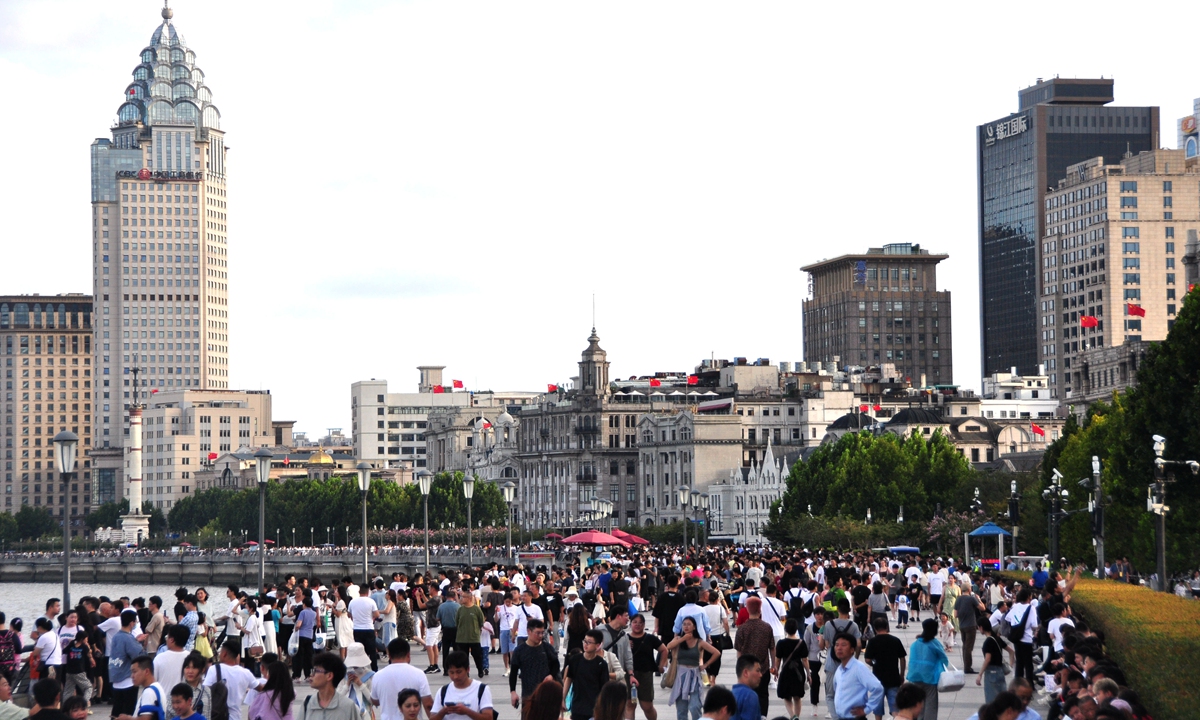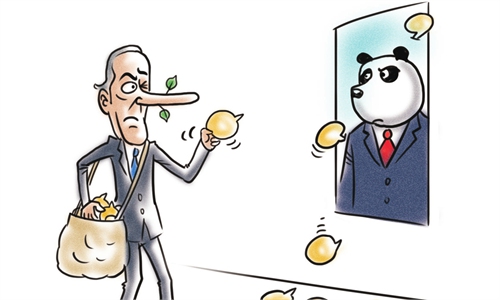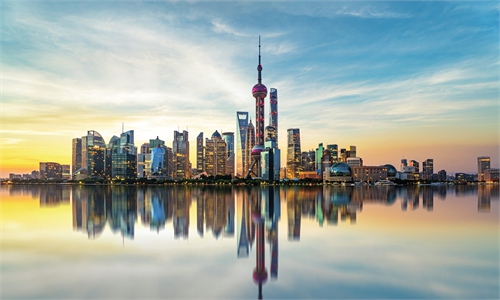IN-DEPTH / IN-DEPTH
GT investigates: Absurd 'Ghost town' slander exposes US' malicious cognitive warfare targeting China's economy, international image
Editor's Note:
The "Cognitive warfare" has become a new form of confrontation between states, and a new security threat. With new technological means, it sets issues and spreads disinformation so as to change people's perceptions and thus alter their self-identity. Launching cognitive warfare against China is an important means for Western anti-China forces to attack and discredit the country. Under the manipulation of the US-led West, the "China threat theory" has continued to ferment. Some politicians and media outlets have publicly smearing China's image by propagating the tones like "China's economy collapse theory" and "China's virus threat theory," in an attempt to incite and provoke dissatisfaction of people in some countries with China. These means all serve the peaceful evolution strategy of the US to contain China's rise and to maintain its hegemony.
The Global Times is publishing a series of articles to systematically reveal the intrigues of the US-led West's cognitive warfare targeting China, expose its lies and vicious intentions, in an attempt to show international readers a true, multi-dimensional and panoramic view of China.
This is the first installment in the series.

Anyone who has been to Lujiazui is likely to be charmed by its dense skyscrapers and bustling roads. The area offers a gorgeous view of the illuminated night skyline and reflects the dreams of people who are striving for a better life.
The Lujiazui Financial City in downtown Shanghai, a famous Chinese financial hub that is home to more than 6,000 Chinese and foreign financial institutions and the location of over 140 transnational corporations' regional headquarters, was recently portrayed as run-down as part of reporting to expose the alleged "deep trouble" in which the Chinese economy finds itself, by US media.
With a couple of photos showing the "empty" streets and shops of Lujiazui, which were obviously taken from certain selective angles, a few US media outlets and opinion leaders absurdly stated that Shanghai - a metropolis of 25 million people - is a "ghost town." Furthermore, they claimed that "China is in trouble."
This absurd smear is just the latest example of the cognitive and psychological warfare launched by the US-led West against China, which intends to defame the Chinese financial market and the country's international image with vicious labels and ridiculous lies, noted observers reached by the Global Times.
But the fact that China's economy is thriving and moving forward vigorously serves as the most powerful refutation against them, they said.
A blatant trickery
US media outlet Newsweek published a story complete with a sensationalized headline on September 9, suggesting that Shanghai had been transformed into "a ghost town."
The story quoted a misleading tweet by a self-claimed US writer Michael Yon, who posted three pictures that seemingly show empty streets, an empty café, and a footbridge with only five pedestrians in Lujiazui. In the September 4 post, Yon said the photos were taken on a Monday, and the "empty" and "quiet" Lujiazui depicted in the photos signals that the Chinese economy is in "deep trouble."
The form of blatant trickery employed by Newsweek and the tweet's author can be easily exposed by anyone who has actually been there. A Global Times reporter has since visited the exact same locations where the three photos were taken, and found that Yon's empty-street photo, for instance, was taken near a road blocked off for maintenance works.
The café showed in the photo was also filled with customers when the Global Times reporter arrived there on a weekday afternoon.
Nancy (pseudonym), a Shanghai resident who works at a trading company in Lujiazui, is a regular customer at the café. She ventured that Yon's empty-café photo was most likely taken in the early morning, when most customers, including her, prefer to place takeaway orders.
"We Lujiazui white-collar workers have very busy meeting-filled mornings. Who has time to sit in the café and enjoy their coffee then?" she asked rhetorically.
As for the empty-footbridge photo, Nancy said the footbridge is not the only pedestrian footpath access in Lujiazui, and workers at local companies usually choose more convenient underground access paths, especially on hot summer days. The footbridge is usually very crowded at weekends, flooded with people who want to enjoy the beautiful city view, she added.
"It's not easy to get the 'empty' photos of Lujiazui. They had to have picked a certain time and find special angles," Nancy commented. "They must have put a lot of effort into discrediting the city."
The three photos have led to widespread criticism on X (formerly known as Twitter). Ben Adegoriola, who introduced himself as a Nigerian living in China, posted a video of a lively Chinese city under the photos. "This was last weekend," he wrote. "All these West-paid propagandists can write anything to defame China's rising glory."
As a main business hub in Shanghai, Lujiazui is always bustling with people, said Shanghai-based economist Xi Junyang, a professor at the Shanghai University of Finance and Economics. The "empty" photos deliberately taken from certain angles do not show the real Lujiazui, he said.
"Newsweek's 'ghost town' story's coverage of China is undoubtedly hostile," Xi told the Global Times. "By distorting the image of Shanghai, it intends to make this international financial center less attractive to global investors."
Apart from Lujiazui, some suburban areas in Shanghai have also been the targets of the Western media's "ghost town" slander. They call the Thames Town in suburban Songjiang district a deserted, decaying "ghost town," turning a blind eye to the fact that Thames Town has become a popular local destination for the weekend, as well as a famous industrial park for cultural and creative companies.
The increasing house prices in Thames Town prove its popularity. The town's average house price is 77,013 yuan ($10,553) per square meter as of September, a 13.18-percent increase from August rates, showed real estate information platform zhuge.com.
Chinese experts believe that the cognitive warfare waged by some US media outlets and think tanks against Shanghai won't make much different, as ridiculous lies are unlikely to weaken Shanghai's attractiveness to global investors.
"The situation in Shanghai is generally optimistic this year. We are continuing a robust post-pandemic recovery," said Xi.

Clumsy tactics
Similar media reports calling Chinese cities "ghost towns" have become more frequent in recent months. Cities like Kunming, the capital of Southwest China's Yunnan Province, and Changzhou in East China's Jiangsu Province, have also involved in this kind of disinformation campaign, the Global Times found.
The "ghost town" narrative is a typical part of the US media's cognitive warfare against China, which tries to influence international audience's perception of China and its cities by portraying the latter as deserted, unpopular, and unpromising places.
Looking back through the first nine months of this year, observant eyes may find that some US media outlets and think tanks have launched several rounds of cognitive warfare against China.
According to data provided by online media monitoring platform Meltwater, so far this year, dozens of mainstream US media outlets and think tanks have published some 114,000 China-related articles. Among them, the numbers of the articles containing neutral, positive, and negative sentiments respectively are 71,700, 19,500, and 23,100, accounting for 62.7 percent, 17 percent, and 20.2 percent.
The most frequently mentioned words in the articles with negative sentiments include "economy," "markets," "investors," "interest rates," and "yuan," showed Meltwater figures. That suggests the Chinese economy and Chinese financial market are the most covered topics by US media outlets and opinion leaders, as well as their main targets of vilification.
In the middle of each month, the National Bureau of Statistics of China releases key Chinese economic data for the previous month. Interestingly, Meltwater's curve graph shows that the middle of almost every month happens to be a month peak in the number of China-related stories containing negative sentiments. China's monthly economic data has seemingly become a good opportunity for naysayers, who may comb through the data report to pick out any points they believe are "pessimistic," and hype them up with eye-grabbing headlines, such as claiming China's reopening trade after the pandemic "is fizzling out," and lambasting the Chinese economy with sensational sentences like "investors start to fret China."
Badmouthing the Chinese economy is a trick used by the US Federal Reserve to drive global private capital back to the US, said economic analyst Tian Yun. "In order to suppress China, the US is resorting to extreme measures," Tian told the Global Times.
Apart from attacking the Chinese economy, in the first nine months of 2023, the US' China-related media coverage with negative sentiment also focused on topics including the pandemic, China's population, China's role in the Russia-Ukraine crisis, the Belt and Road Initiative (BRI), the "debt trap" narrative, and the "spy balloon" allegations, according to Meltwater statistics.
Chinese experts said that most of the topics are nothing new to the readers, merely defamation cliches by the US against China from its economic performance to its international image.
"Through the various rounds of cognitive warfare, the US attempts to labeling China as a hopeless and disruptive bully, and a threat to the current international order," a Shanghai-based scholar in American Studies told the Global Times.
The "debt trap" rumor that targets the BRI is a typical disinformation campaign by the US-led West to sow suspicion in China's cooperation with other countries, the scholar exampled. "All these accusations and slanders serve the US' strategic goal of curbing the expansion of China's geopolitical and geo-economic influences," he told the Global Times.
Ironically, behind this "ambitious goal" are usually clumsy tricks attempted by US media outlets and think tanks that make their smear campaign against China less than unconvincing. Audiences have found that much of this China-related coverage cites disreputable sources, who, most of the time simply, drops a bombshell without giving any solid evidence to prove its authenticity.
A fresh round of rumors hyped up by US media sources early this year that accused Chinese companies of "selling Russia weapons" is a typical example. An NBC article on February 19 said, "China may be providing non-lethal military assistance to Russia for use in Ukraine," by citing "four US officials familiar with the matter" and "sources familiar with the matter." The Global Times later proved the accusation to be completely groundless.
The so-called "military aid" being transported from Central China's Henan Province to Moscow in late 2022 was in fact some ordinary commodities including clothes that Russian importers purchased from China.
Some US media outlets also like to bolster false narratives with misleading photos that far from reflect the truth. Like Newsweek's "ghost town" story and the "empty Lujiazui" photos it cited, such stories are filled with laughably ridiculous lies that may only fool those who are blind, deaf, or mentally impaired, said observers.
These clumsy cognitive warfare tricks will not hurt China, but do harm the credibility and reputation of US media outlets and think tanks, said the Shanghai-based scholar.
"China and Shanghai are open, and it's easy for the world to get the truth," he said. "The fact that China is moving forward to higher level of development will punch rumormongers in their faces."
The "Cognitive warfare" has become a new form of confrontation between states, and a new security threat. With new technological means, it sets issues and spreads disinformation so as to change people's perceptions and thus alter their self-identity. Launching cognitive warfare against China is an important means for Western anti-China forces to attack and discredit the country. Under the manipulation of the US-led West, the "China threat theory" has continued to ferment. Some politicians and media outlets have publicly smearing China's image by propagating the tones like "China's economy collapse theory" and "China's virus threat theory," in an attempt to incite and provoke dissatisfaction of people in some countries with China. These means all serve the peaceful evolution strategy of the US to contain China's rise and to maintain its hegemony.
The Global Times is publishing a series of articles to systematically reveal the intrigues of the US-led West's cognitive warfare targeting China, expose its lies and vicious intentions, in an attempt to show international readers a true, multi-dimensional and panoramic view of China.
This is the first installment in the series.

Crowds of tourists flock to the Bund and Nanjing Road pedestrian street in Shanghai on August 27, 2023. Photo: VCG
Anyone who has been to Lujiazui is likely to be charmed by its dense skyscrapers and bustling roads. The area offers a gorgeous view of the illuminated night skyline and reflects the dreams of people who are striving for a better life.
The Lujiazui Financial City in downtown Shanghai, a famous Chinese financial hub that is home to more than 6,000 Chinese and foreign financial institutions and the location of over 140 transnational corporations' regional headquarters, was recently portrayed as run-down as part of reporting to expose the alleged "deep trouble" in which the Chinese economy finds itself, by US media.
With a couple of photos showing the "empty" streets and shops of Lujiazui, which were obviously taken from certain selective angles, a few US media outlets and opinion leaders absurdly stated that Shanghai - a metropolis of 25 million people - is a "ghost town." Furthermore, they claimed that "China is in trouble."
This absurd smear is just the latest example of the cognitive and psychological warfare launched by the US-led West against China, which intends to defame the Chinese financial market and the country's international image with vicious labels and ridiculous lies, noted observers reached by the Global Times.
But the fact that China's economy is thriving and moving forward vigorously serves as the most powerful refutation against them, they said.
A blatant trickery
US media outlet Newsweek published a story complete with a sensationalized headline on September 9, suggesting that Shanghai had been transformed into "a ghost town."
The story quoted a misleading tweet by a self-claimed US writer Michael Yon, who posted three pictures that seemingly show empty streets, an empty café, and a footbridge with only five pedestrians in Lujiazui. In the September 4 post, Yon said the photos were taken on a Monday, and the "empty" and "quiet" Lujiazui depicted in the photos signals that the Chinese economy is in "deep trouble."
The form of blatant trickery employed by Newsweek and the tweet's author can be easily exposed by anyone who has actually been there. A Global Times reporter has since visited the exact same locations where the three photos were taken, and found that Yon's empty-street photo, for instance, was taken near a road blocked off for maintenance works.
The café showed in the photo was also filled with customers when the Global Times reporter arrived there on a weekday afternoon.
Nancy (pseudonym), a Shanghai resident who works at a trading company in Lujiazui, is a regular customer at the café. She ventured that Yon's empty-café photo was most likely taken in the early morning, when most customers, including her, prefer to place takeaway orders.
"We Lujiazui white-collar workers have very busy meeting-filled mornings. Who has time to sit in the café and enjoy their coffee then?" she asked rhetorically.
As for the empty-footbridge photo, Nancy said the footbridge is not the only pedestrian footpath access in Lujiazui, and workers at local companies usually choose more convenient underground access paths, especially on hot summer days. The footbridge is usually very crowded at weekends, flooded with people who want to enjoy the beautiful city view, she added.
"It's not easy to get the 'empty' photos of Lujiazui. They had to have picked a certain time and find special angles," Nancy commented. "They must have put a lot of effort into discrediting the city."
The three photos have led to widespread criticism on X (formerly known as Twitter). Ben Adegoriola, who introduced himself as a Nigerian living in China, posted a video of a lively Chinese city under the photos. "This was last weekend," he wrote. "All these West-paid propagandists can write anything to defame China's rising glory."
As a main business hub in Shanghai, Lujiazui is always bustling with people, said Shanghai-based economist Xi Junyang, a professor at the Shanghai University of Finance and Economics. The "empty" photos deliberately taken from certain angles do not show the real Lujiazui, he said.
"Newsweek's 'ghost town' story's coverage of China is undoubtedly hostile," Xi told the Global Times. "By distorting the image of Shanghai, it intends to make this international financial center less attractive to global investors."
Apart from Lujiazui, some suburban areas in Shanghai have also been the targets of the Western media's "ghost town" slander. They call the Thames Town in suburban Songjiang district a deserted, decaying "ghost town," turning a blind eye to the fact that Thames Town has become a popular local destination for the weekend, as well as a famous industrial park for cultural and creative companies.
The increasing house prices in Thames Town prove its popularity. The town's average house price is 77,013 yuan ($10,553) per square meter as of September, a 13.18-percent increase from August rates, showed real estate information platform zhuge.com.
Chinese experts believe that the cognitive warfare waged by some US media outlets and think tanks against Shanghai won't make much different, as ridiculous lies are unlikely to weaken Shanghai's attractiveness to global investors.
"The situation in Shanghai is generally optimistic this year. We are continuing a robust post-pandemic recovery," said Xi.

People watch the parade performance at Shanghai Disneyland on June 26, 2023. Photo: VCG
Clumsy tactics
Similar media reports calling Chinese cities "ghost towns" have become more frequent in recent months. Cities like Kunming, the capital of Southwest China's Yunnan Province, and Changzhou in East China's Jiangsu Province, have also involved in this kind of disinformation campaign, the Global Times found.
The "ghost town" narrative is a typical part of the US media's cognitive warfare against China, which tries to influence international audience's perception of China and its cities by portraying the latter as deserted, unpopular, and unpromising places.
Looking back through the first nine months of this year, observant eyes may find that some US media outlets and think tanks have launched several rounds of cognitive warfare against China.
According to data provided by online media monitoring platform Meltwater, so far this year, dozens of mainstream US media outlets and think tanks have published some 114,000 China-related articles. Among them, the numbers of the articles containing neutral, positive, and negative sentiments respectively are 71,700, 19,500, and 23,100, accounting for 62.7 percent, 17 percent, and 20.2 percent.
The most frequently mentioned words in the articles with negative sentiments include "economy," "markets," "investors," "interest rates," and "yuan," showed Meltwater figures. That suggests the Chinese economy and Chinese financial market are the most covered topics by US media outlets and opinion leaders, as well as their main targets of vilification.
In the middle of each month, the National Bureau of Statistics of China releases key Chinese economic data for the previous month. Interestingly, Meltwater's curve graph shows that the middle of almost every month happens to be a month peak in the number of China-related stories containing negative sentiments. China's monthly economic data has seemingly become a good opportunity for naysayers, who may comb through the data report to pick out any points they believe are "pessimistic," and hype them up with eye-grabbing headlines, such as claiming China's reopening trade after the pandemic "is fizzling out," and lambasting the Chinese economy with sensational sentences like "investors start to fret China."
Badmouthing the Chinese economy is a trick used by the US Federal Reserve to drive global private capital back to the US, said economic analyst Tian Yun. "In order to suppress China, the US is resorting to extreme measures," Tian told the Global Times.
Apart from attacking the Chinese economy, in the first nine months of 2023, the US' China-related media coverage with negative sentiment also focused on topics including the pandemic, China's population, China's role in the Russia-Ukraine crisis, the Belt and Road Initiative (BRI), the "debt trap" narrative, and the "spy balloon" allegations, according to Meltwater statistics.
Chinese experts said that most of the topics are nothing new to the readers, merely defamation cliches by the US against China from its economic performance to its international image.
"Through the various rounds of cognitive warfare, the US attempts to labeling China as a hopeless and disruptive bully, and a threat to the current international order," a Shanghai-based scholar in American Studies told the Global Times.
The "debt trap" rumor that targets the BRI is a typical disinformation campaign by the US-led West to sow suspicion in China's cooperation with other countries, the scholar exampled. "All these accusations and slanders serve the US' strategic goal of curbing the expansion of China's geopolitical and geo-economic influences," he told the Global Times.
Ironically, behind this "ambitious goal" are usually clumsy tricks attempted by US media outlets and think tanks that make their smear campaign against China less than unconvincing. Audiences have found that much of this China-related coverage cites disreputable sources, who, most of the time simply, drops a bombshell without giving any solid evidence to prove its authenticity.
A fresh round of rumors hyped up by US media sources early this year that accused Chinese companies of "selling Russia weapons" is a typical example. An NBC article on February 19 said, "China may be providing non-lethal military assistance to Russia for use in Ukraine," by citing "four US officials familiar with the matter" and "sources familiar with the matter." The Global Times later proved the accusation to be completely groundless.
The so-called "military aid" being transported from Central China's Henan Province to Moscow in late 2022 was in fact some ordinary commodities including clothes that Russian importers purchased from China.
Some US media outlets also like to bolster false narratives with misleading photos that far from reflect the truth. Like Newsweek's "ghost town" story and the "empty Lujiazui" photos it cited, such stories are filled with laughably ridiculous lies that may only fool those who are blind, deaf, or mentally impaired, said observers.
These clumsy cognitive warfare tricks will not hurt China, but do harm the credibility and reputation of US media outlets and think tanks, said the Shanghai-based scholar.
"China and Shanghai are open, and it's easy for the world to get the truth," he said. "The fact that China is moving forward to higher level of development will punch rumormongers in their faces."




